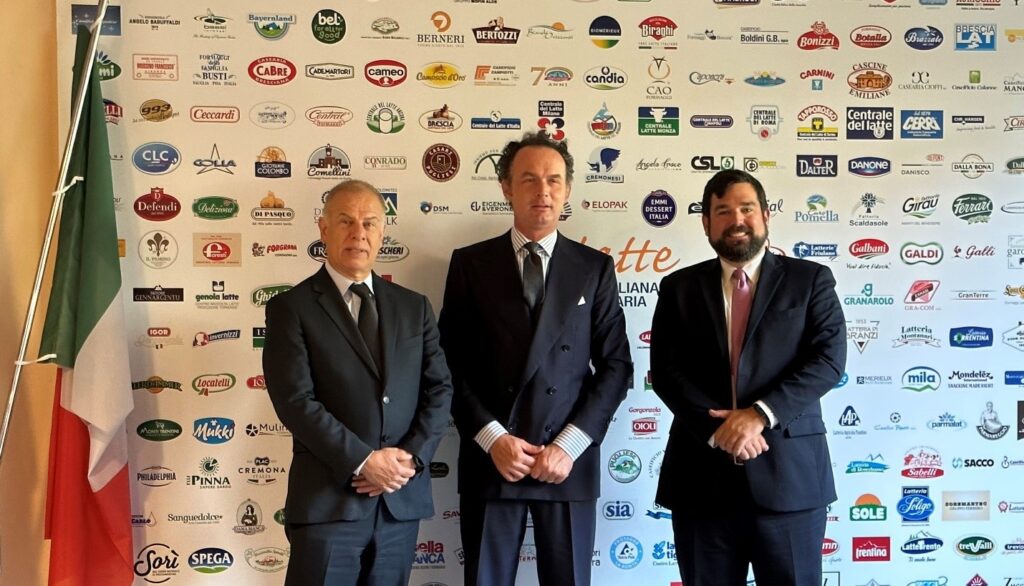- Championed the introduction of the Safeguarding American Value-Added Exports (SAVE) Act to protect market access for U.S. cheesemakers
- Secured the right of producers to use the common name “gruyere” in the U.S. market through a landmark legal victory in the U.S. Court of Appeals for the Fourth Circuit
- Led engagement with the U.S. government to hold Canada accountable for its ongoing violations of USMCA’s dairy provisions
- Promoted U.S. dairy’s trade initiatives and sustainability progress as lead sponsor of the Asia-Pacific Economic Cooperation’s agricultural ministerial luncheon in Seattle
- Formed alliances with dairy and agricultural organizations worldwide to strengthen and grow NMPF’s voice.
NMPF trade activities this year have included initiatives that defend U.S. products in the global arena while expanding trade. Efforts made in collaboration with the U.S. Dairy Export Council (USDEC) and the Consortium for Common Food Names (CCFN) prompted the May 17 introduction of the bipartisan, bicameral Safeguarding American Value-Added Exports (SAVE) Act to increase U.S. government actions to protect common terms like “parmesan” and “feta” in export markets. The milestone bill to advance common name protections capped off months of congressional engagement, including a March 1 event on Capitol Hill.
The SAVE Act explicitly defines “common names” as a term ordinarily used for marketing a food product, as determined by the U.S. Department of Agriculture (USDA), and directs the U.S. government to proactively defend the rights of U.S. common name users and exporters. Led in the Senate by Sens. John Thune, R-SD, Tammy Baldwin, D-WI, Roger Marshall, R-KS, and Tina Smith, D-MN, and in the House by Reps. Dusty Johnson, R-SD, Jim Costa, D-CA, Michelle Fischbach, R-MN, and Jimmy Panetta, D-CA, the SAVE Act is expected to be incorporated into the 2023 Farm Bill. Members and supporters can make their voice heard by writing to their representatives in Congress through NMPF’s advocacy platform.
NMPF also secured a key victory for U.S. cheese producers and dairy farmers through a March 3 ruling from the U.S. Court of Appeals for the Fourth Circuit, which confirmed that “gruyere” is a common name, in opposition to French and Swiss consortiums which hoped to trademark the term in the U.S. market. The NMPF trade policy team, alongside USDEC and CCFN, worked diligently with the legal team to ensure that American gruyere producers can continue to market and sell their products in the United States.
NMPF’s dedication to building dairy exports through expanding market has included fly-ins to DC, use of congressional trade hearings to elevate dairy priorities, meetings with USTR and USDA political appointees on trade, intensive work with U.S. negotiators on using the Indo-Pacific Economic Framework to address nontariff trade barriers, and joint agricultural coalition efforts such as the trade-focused August 21 letter to 2024 Presidential candidates urging a greater commitment to trade agreements.
Efforts also extend to ensuring existing agreements deliver full benefits for U.S. dairy. NMPF commended the U.S. government’s Jan. 31 announcement that it requested a second USMCA panel to hold Canada responsible for violating the agreement’s dairy market access obligations. The announcement resulted from extensive work by NMPF with USTR and USDA last year to ensure that the second USMCA case was well-positioned for success. NMPF and USDEC since January have continued to work closely with USTR and USDA to support their case and ensure that Canada grants U.S. producers and exporters the market access negotiated and promised under USMCA.
To bolster NMPF’s work to preserve and expand market access for dairy products in markets around the world, the organization has also continued to grow its global voice and influence, forming partnerships with leading dairy and agricultural organizations overseas.
As governments around the world embrace protectionist stances and adopt ill-advised policies, NMPF strives to continue to grow its network of allies to support pro-dairy, pro-trade and science-based rules. Strengthening ties in Latin America, NMPF announced on April 20 a new collaboration with the National Agricultural Organizations from Argentina, Brazil, Paraguay, Uruguay, Chile, Bolivia and Colombia to represent the dairy and livestock industry in international climate discussions. During a trip to Japan, NMPF formalized a July 6 “Letter of Friendship” with JA-Zenchu, Japan’s Central Union of Agricultural Cooperatives, to address the common difficulties that dairy farmers in the two countries are facing. Most recently, NMPF and USDEC signed on July 27 an agreement with the Italian Dairy Association, Assolatte, to promote the nutritional benefits of dairy products and support dairy-friendly policies in international forums.






